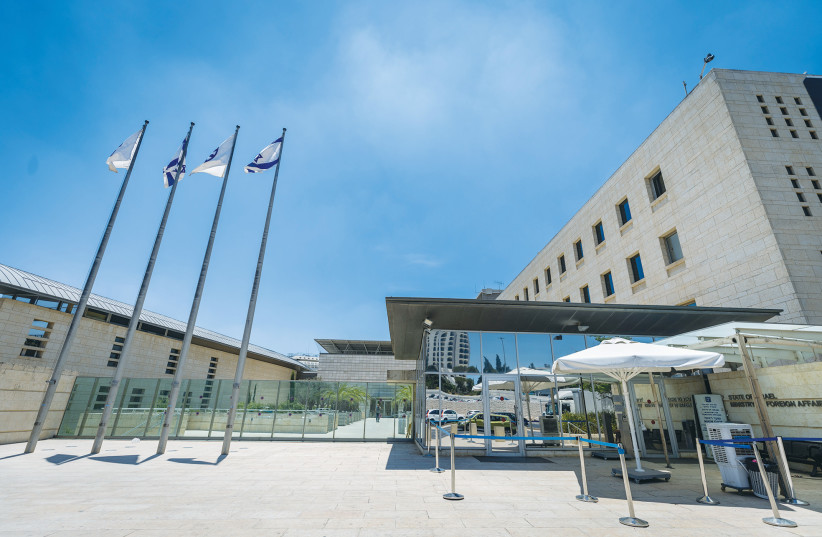Jerusalem-based businessman, diplomat and community activist Werner Loval died last week at the age of 96. Loval was one of those people of whom it could be said that his was a life well lived in its diversity of geography and experience.
Born into a well-established Jewish family in Bamberg, Germany, in 1926, he was seven years old when Hitler came to power. The boy was expelled from school, his family’s assets were confiscated, his father was arrested and sent to Dachau for three weeks, and life for Jews in Germany became increasingly difficult and dangerous.
Just before the outbreak of the Second World War, Werner and his sister Erica were sent to England on a kindertransport and spent the early war years in a boarding school for German-Jewish children.
Fortunately, their parents, after several desperate attempts to secure visas, were able to leave Germany and the family was reunited in Ecuador. However, this was not before Werner and Erica had to travel from London to Glasgow in August 1942 to board a freighter to Buenos Aires, from where they traveled by car to Chile and then by boat to Ecuador, where they arrived in October and were greeted at the port by their father.
Loval’s first job in Ecuador was in a pharmaceutical factory established by Jews and employing mainly Jewish refugees. His second job was in a metal works company. His next job was with a South American Trading Company, where he was assigned to deal with English correspondence. Still dealing with correspondence in English, he was next employed by the US Military Mission in Quito. This was followed by a stint as a stringer for Time magazine.

In September 1945, Loval moved to the US, where he had relatives. Not long after he started working for a textile company, he was conscripted into the US Army.
On completion of his army service, he returned to working in international trade, but wanted to get out of this and into diplomacy on behalf of the nascent State of Israel. While working in international trade, he made several important contacts, including at the Israel Embassy. The Israel Consul for Economic Affairs in New York invited him to join the American Economic Committee for Palestine, which worked closely with the economic division of the Israel Embassy. During this period, Loval was also active with the YMHA and wrote for its bulletin.
Moving to Israel
In 1953, Loval moved to Jerusalem and began working at the Foreign Ministry. He had a wonderful time during his first year in Israel, accompanying visiting VIPs such as Eleanor Roosevelt around the country, and in this way also learned a lot about Israel.
In 1955, he met Pamela Sabel, who became his wife. They married in September 1956 in the first kosher wedding at Jerusalem’s King David Hotel. Among the guests were Moshe and Ruth Dayan, Moshe Sharett and his wife, Dov Yosef and his wife, Walter Eytan, Teddy and Tamar Kollek, Jerusalem Post founding editor Gershon Agron, Chaim and Aura Herzog, Zalman Shazar and many ambassadors and other dignitaries.
The Lovals made a point of returning to the King David on milestone wedding anniversaries.
Today, Jerusalem is one big construction site. In the 1950s, it was relatively barren. As a member of the Association of Americans and Canadians in Israel, Loval developed a strategy that led to the creation of Jerusalem’s Nayot neighborhood, which was subsequently inhabited primarily by immigrants from Western countries, mainly North America. Most of the Nayot families moved into their new homes in 1961-62.
The Lovals stayed in Nayot until 2008, when they moved to the Nofei Yerushalayim retirement residence.
In the interim, they had served as diplomats in Guatemala, El Salvador, Honduras, Costa Rica, Nicaragua, Panama and Mexico, and continued to maintain relationships with the diplomatic representatives of those countries in Israel.
After eventually leaving the foreign service, Loval set up his own business, Capital Building and Real Estate Ltd., and later joined forces with South African entrepreneur David Blumberg to create Anglo Saxon Real Estate, which boomed into one of Israel’s leading real estate companies.
The Lovals were among the founding members of the Har-El Reform Synagogue in Jerusalem’s Rehavia neighborhood and played a major role in the development of the Israel Movement for Progressive Judaism.
There are many other projects and adventures to Werner Loval’s credit, and no doubt his wife, Pamela, their two sons and two daughters, plus their 12 grandchildren and many great-grandchildren will continue to look back on his life with nostalgia, affection and pride.
